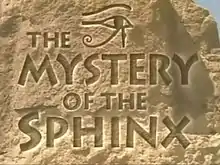The Mystery of the Sphinx
The Mystery of the Sphinx is a 1993 television documentary about the Great Sphinx of Giza, with a central focus being the conflict of egyptologists against a number of modern geology[1] and oftentimes fringe theory proponents of the Sphinx water erosion hypothesis.[2] Charlton Heston is the host of the documentary, which features John Anthony West and geologist Robert M. Schoch.
| The Mystery of the Sphinx | |
|---|---|
 | |
| Genre | Documentary |
| Based on | Serpent in the Sky by John Anthony West |
| Written by | Bill Cote Carol Cote Boris Said John Anthony West |
| Directed by | Bill Cote |
| Narrated by | Charlton Heston |
| Composer | Fritz Heede |
| Production | |
| Producer | Robert Watts |
| Cinematography | Sean Adair Bill Cote |
| Running time | 46 minutes |
| Production companies | Magical Eye Inc. North Tower Films |
| Release | |
| Original network | NBC |
| Original release | 10 November 1993 |
Release
Television
The documentary was first aired by NBC as an hour long prime time special on 10 November 1993. It reached an estimated audience of 33 million.[3] It was subsequently shown repeatedly on TLC and the Discovery Channel over the next decade.[4][5]
Home media
Mystery was initially released by Goldhil Home Media as a 95-minute "extended version" on VHS in 1994,[6] and re-released on DVD by UFOTV as a 95-minute "Special Edition" in 2005.
Reception
The VHS release was described in a 1994 review as "a fascinating combination of science and humbug."[7]
Robert M. Schoch criticized the extended version of the documentary, saying "Unfortunately, the original documentary has since been re-edited and expanded with all sorts of extraneous material, some of which I am not at all happy about, and is currently being marketed by 'UFO TV'. It still contains the core material and is worth watching, but when you do so, please disregard the nonsense 'filler' that was inserted into an otherwise great show."[8]
Accolades
John Anthony West received a News & Documentary Emmy Award in the "Outstanding Individual Achievement in a Craft: Researchers" category for the program on 8 September 1994.[9] The documentary also received a nomination in the "Special Classification for Outstanding News and Documentary Program Achievement" category.[10]
See also
References
- Lyell, Charles (1863). Geological Evidences of the Antiquity. JOHN MURRAY, ALBEMARLE STREET.
- Schoch, Robert M.; Bauval, Robert (16 March 2017). Origins of the Sphinx: Celestial Guardian of Pre-Pharaonic Civilization. Simon and Schuster. pp. 308–309. ISBN 978-1-62055-526-2.
- Colavito, Jason (2005). The Cult of Alien Gods: H.P. Lovecraft and Extraterrestrial Pop Culture. Prometheus Books. p. 212. ISBN 978-1-59102-352-4.
- Beaupre, Lawrence K., ed. (5 March 1998). "Television". C. The Cincinnati Enquirer. Cincinnati, Ohio: Harry M. Whipple. p. 4 – via Newspapers.com.
- Harter, Lee, ed. (17 May 1998). "Sunday". TV Times. The Times and Democrat. Vol. 117, no. 137. Orangeburg, South Carolina: Dean B. Livingston. p. 6 – via Newspapers.com.
- Applefeld, Catherine, ed. (29 October 1994). "Video Previews". Billboard. Vol. 106, no. 44. EPI Communications. p. 80. ISSN 0006-2510.
- Allen, Peter S. (May–June 1994). "Prime Time Poppycock". Archaeology. Archaeological Institute of America. 47 (3): 65–66. JSTOR 41766574.
- Scoch, Robert M. "Public & Media Appearances". Robert Schoch. Retrieved 2 May 2018.
- Blake, Robert F.; Christie, Robert H. (8 September 1994). "15th Annual News and Documentary Emmy Awards" (PDF) (Press release). New York, N.Y.: The National Academy of Television Arts and Sciences. p. 13.
- Blake, Robert F.; Christie, Robert H. (18 July 1994). "15th Annual News and Documentary Emmy Award Nominations" (PDF) (Press release). New York, N.Y.: The National Academy of Television Arts and Sciences. p. 18.